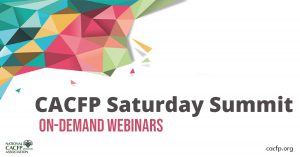CACFP Saturday Summit
Tiny Tummies, Big Adventures: Understanding Infant Development ($)
Early childhood is a critical phase in nurturing healthy relationships with food and fostering overall development. Explore the sequential journey infants embark upon, from mastering fundamental coordination of sucking, breathing, and swallowing to the gradual acquisition of key feeding skills such as chewing and tongue control. Use the “Stages of Infant Development and Feeding Skills” resource to gain insights into developmental milestones. Uncover the intricacies of each learning step and on the remarkable process of how infants evolve their feeding abilities.
Read MoreTackling Inflation with Smart Budgeting ($)
With the inflation in food costs, the struggle to purchase foods while staying in a budget can be challenging. But is it possible to buy healthy foods and make delicious meals on a budget? Yes! Learn how to plan, utilize savvy shopping techniques, and receive a budget-friendly 2-week cycle menu along with some recipe ideas to try.
Read MoreSnack Attack: Elevate Your Snack Game ($)
Day in and day out, the same snacks are being served. You’ve been longing to elevate your snack game, but you’re lacking ideas. Next up on the menu: snacks, snacks, and more snacks! Hit reset on your menus with some fresh snack tips and recipe ideas. Get creative and add something exciting to the plate for you and the children in your care.
Read MoreLittle Chefs, Big Appetites ($)
We know that children are more likely to try a new food when they are involved in creating a meal or snack. But how do you set up a safe environment at your family child care home that allows children to do this? Learn different strategies on how your kitchen helpers can assist you in making food with age-appropriate tasks, whether it is in the kitchen or eating area. Receive easy recipes to hone their fine motor skills while handling food.
Read MoreStraw Bales: A New Way to Garden ($)
No space? No soil? No problem. Learn how to start a straw bale garden from beginning to end. You will be ready to plant and grow with the children in your care this Spring!
Read MoreMeal Service Made Fun ($)
Add some pizazz to meal or snack time with visually appealing, delicious, and exciting new recipes! Learn how to make power bowls with fresh ingredients and easy charcuterie boards for meals and snack times. Looking for a few meal ideas that don’t require a lot of preparation? Get inspired with muffin tin, slow cooker and sheet pan recipes, where you can include at least 2 CACFP meal components in one dish.
Read MoreMenu Planning Made Easy ($)
CACFP home and commercial kitchens operate at their best with well-planned menus. Menus drive budgets, kitchen efficiency, purchasing/grocery shopping, receiving, customer satisfaction, and so much more. Join Chef Brenda to learn how to cr
Read MoreBaking Whole Grain-Rich Foods ($)
Whole grain-rich baking can be a signature part of your program that benefits menus, snacks, and acceptance while also helping your bottom-line. Learn how to choose a few signature favorite foods and align them with baking activities to involve children and parents in the science, literacy, art, food safety and math to boost benefits beyond the plate. Take home whole grain-rich baking resources.
Read MorePlanning Developmentally Appropriate Menus ($)
Menus are not “one size fits all”! In this session, we will review feeding skills and milestones, and present strategies for planning menus that meet children’s developmental needs from 0-5 years. Participants will learn tips and tricks that prevent picky eating habits and will review common choking hazards to avoid for young children.
Read MoreMovement and Fun: Learn Ways to Promote Active Play with Infants and Toddlers ($)
Learn fun, developmentally appropriate physical activities to play with infants and toddlers in CACFP child care homes and centers and Early Head Start classrooms. Consider the many benefits of physical activity and how these activities help meet recommended best practices. View demonstrations and videos of these activities so you can apply these ideas in your own trainings.
Read More
